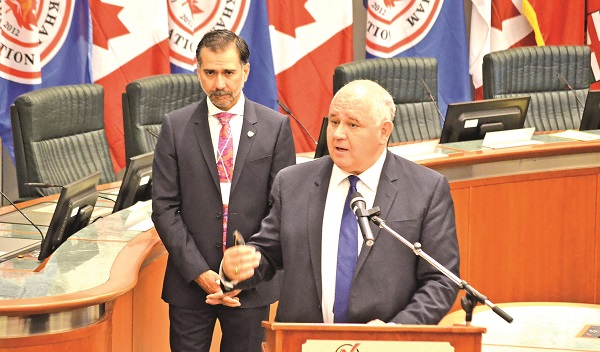General News » News
Ontario municipalities are “fighting the same fight” on OMB reform
May 18, 2016 · 0 Comments

By Brock Weir
Representatives from across Ontario descended on Markham’s City Hall on Saturday for a wide-ranging summit on coming together with a common voice, calling for change at the Ontario Municipal Board (OMB).
“We wouldn’t have this opportunity if it wasn’t for their desire to bring this all together into the municipal world and have a mature, adult discussion, one we hope is founded in common sense, one that is founded in common interest for the betterment of all our municipalities,” said Markham Mayor Frank Scarpitti in his speech of welcome to Council members from nearly 70 individual municipalities, as well as stakeholders both for and against significant reforms to the OMB, which is often the final arbiter on planning issues in Towns large and small when it comes to disagreements between municipalities and developers.
The summit came into being following notices of motion from Councillors Tom Mrakas and Michael Thompson earlier this year calling for wider support of OMB reform, advocating for “appropriate development of local spaces” and similar issues.
These motions have rapidly gained momentum across the Province, receiving the endorsement of over 150 municipalities. This, according to Councillor Mrakas, shows there is a healthy appetite for change.
“I think it is pretty extraordinary what is happening,” said Councillor Mrakas., adding it has evolved into a “significant grassroots movement” for change. “Personally, I think it is pretty extraordinary. This municipal summit on OMB reform truly is unique. To the best of our knowledge, this has never been done before [where] a group of Councillors from different municipalities have self-organized and gotten together and reached out to municipalities across the province.
“I think and I believe it is because many of us are frustrated with the lack of predictability and land use planning decision-making. Currently, we, as municipalities spend months and untold hundreds of thousands of dollars on official plans…yet you never know that a municipal council decision will stand or whether it will be appealed, and then overturned at the OMB. The effect on our communities has been compounded over time, with each application, each request for a change here, a change there to our official plans.
“Right now, we are all fighting the same fight and we are all wasting millions of taxpayers’ dollars on that same fight. That just doesn’t make sense. What we need is a planning system that works for everyone. I believe we want a say in how we grow, how we evolve and we want appropriate development that meets the need and the vision of the community in which it is proposed. We need to level the playing field by creating a rulebook we can all understand. By working collectively and individually, we, as municipal representatives, can provide that much-needed, informed input to reforming the process.”
The afternoon featured discussions on a broad range of topics, including breakout groups for municipal representatives to go through their individual issues with the Ontario Municipal Board, as well as a panel discussion moderated by Bill Hogg with former leaders within the OMB, lawyers with a history of OMB hearings, expert ratepayers and those who quite literally wrote the book on the OMB.
Those experts said they were intrigued by how this will all shake down in the end.
One such speaker was Pat Vanini, Executive Director of the Association of Municipalities of Ontario, a woman with a 40-year history of working with the OMB who described herself as “a recovering land use planner.”
“During these 40 years of my experience, there has not been one government of the day, either in its campaign platform or during its tenure as a government that ever said it was time to abolish the OMB,” she said. “There are some people who still hold the perspective that the OMB is a needed check and balance because Councils cannot be trusted to make the right decision. It is a perspective that is, unfortunately, rooted in history, but I don’t believe it is necessarily rooted in full case history.
“The province tends to say it works in an evidence-based world. Some days that is absolutely true and some days it is a little harder to figure out what the evidence was, but we will be doing more work.”











